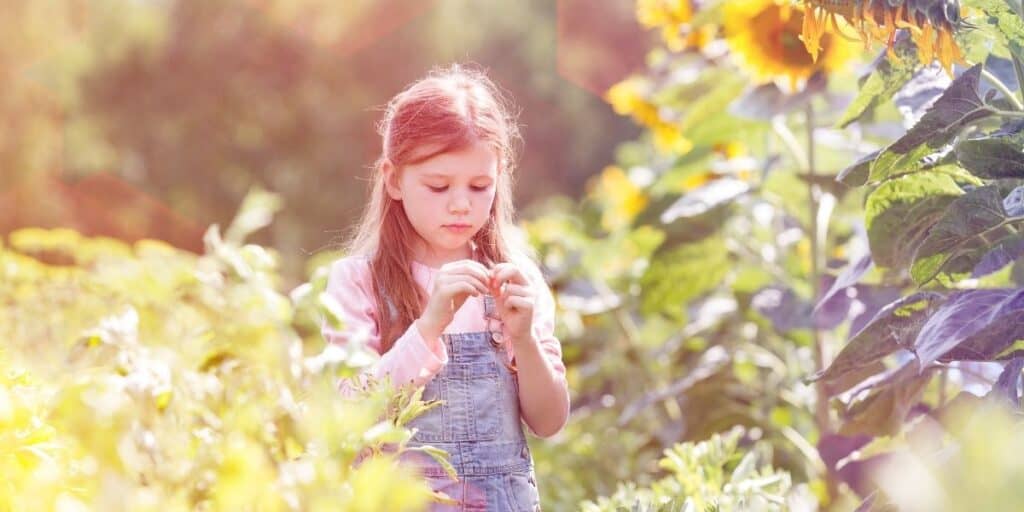Eco-conscious parents often tell me they either feel guilty or stressed about their family’s lifestyle, and many sustainable living tips don’t work for their families. I also used to get lost in the weeds of well-meaning eco-tips that actually made parenting feel even harder than it already is. I believe a sustainable lifestyle should be easily achievable for everyone everywhere, otherwise, it’s not actually sustainable (pardon the pun). So here I explain what it means to be eco-conscious, how to make environmentally friendly food choices that won’t make you feel guilty, the sustainable energy solutions I focus on, how to buy eco-conscious clothes, and what I no longer feel stressed or guilty about.

The definition of eco-conscious
Let’s begin with what it means to be eco-conscious. Being eco-conscious (aka environmentally conscious) means you’re aware that you have an environmental footprint, and you do what you can to reduce it.
Your environmental footprint consists of many factors. For example, there’s the amount of garbage your lifestyle generates, your diet, the car you drive, the energy you use at home, and how much you shop. There’s also your carbon footprint, which is more specifically related to how much carbon dioxide your lifestyle adds to the atmosphere. So if you’re eco-conscious, you’re aware of your environmental and carbon footprint, and you’re actively trying to reduce it.
What does “sustainable” mean
Being eco-conscious is the same as being sustainability-minded, so I’d like to quickly cover what the term “sustainable” means in relation to the environment. I use the definition of sustainable development that comes from Our Common Future to define what sustainable means. (Our Common Future is often referred to as the Brundtland report.)
“Sustainable development is development that meets the needs of the present without compromising the ability of future generations to meet their own needs.” To expand this further into what it means to be a environmentally conscious, I’ll use another quote from the report.
“Perceived needs are socially and culturally determined, and sustainable development requires the promotion of values that encourage consumption standards that are within the bounds of the ecological possible and to which all can reasonably aspire.”
When I wonder what the eco-conscious thing to do is I ask myself, “can everyone reasonably aspire to this?” If it’s not reasonable to expect everyone to be able to do it, I try not to stress or feel guilty if I can’t do it either.
Read: How to talk with your kids about environmental issues without scaring them
Environmentally friendly food choices
You may have heard a lot about how to make environmentally food choices, but some tips I read are simply not realistic for my family. I’m always trying to balance a fine line between what’s right for my family and what’s best for the environment. I’ll give you an example from my own life. Packing a school lunch or picnic. I used to go into analysis paralysis with questions like; Is it OK to buy pre-packaged snacks? Does my family need to be vegan? Does everything have to be locally grown and organic?
Now, I’ve learned to keep things simple. Here’s what I focus on in the kitchen instead:
Waste less food
Before I even start thinking about what I’ll pack my kid’s lunches in, or how and where it was grown, I ask myself if they’re going to actually eat it. Kids being kids they tend to be picky. When they’re with their friends, they’re often so focused on playing that they won’t eat more than a sandwich and maybe a string cheese or a granola bar. So instead of packing them an elaborate lunch that may look fancy but will probably get thrown away, I give them what I know they’ll eat. You may wonder what that has to do with making environmentally friendly food choices, but up to 40% of the food in the United States is never eaten according to the Natural Resources Defense Council.
“Producing uneaten food squanders a whole host of resources—seeds, water, energy, land, fertilizer, hours of labor, financial capital—and generates greenhouse gases at every stage—including methane when organic matter lands in the global rubbish bin. The food we waste is responsible for roughly 8 percent of global emissions,” according to Drawdown.org.
So you see, not wasting food is the most environmentally friendly food choice most of us can make on a daily basis.
Use reusable containers when possible
In my own community, I often see that when kids get juice boxes and water bottles they take a few sips, put them down, then forget about it. Since no one knows who drank out of that container, it gets thrown away within minutes. Not only is the water or juice wasted, but also the packaging. A more eco-conscious choice is to simply bring a water bottle (or even pour juice in a reusable container). This reduces food waste since the child is familiar with his or her own bottle, and it also prevents packaging waste.
On a larger scale, even sports teams are starting to use eco-friendly reusable containers on the road. In Soccer Start Lauren Barnes brings sustainability to her pandemic bubble, Lauren explains how she worked with eco-conscious companies to help her soccer team OL Reign transition away from disposable water bottles and containers, and toward more sustainable containers even while on the road.
“Eat food, mostly plants, not too much”
I’ve had the same food motto for over a decade, and whenever I wonder what the most environmentally friendly food choice is, I remember to “Eat food, mostly plants, not too much.” It comes from the book Food Rules by Michael Pollan.
You may have read that we can reduce our personal greenhouse gas emissions by going vegan or vegetarian.
“The literature on the impact of reducing or cutting out meat from your diet varies. Some studies show that choosing vegetarian options would only reduce greenhouse gas emissions per person by 3%. Others show a reduction in emissions per person of 20-30% for halving meat consumption,” according to Going vegan: can switching to a plant-based diet really save the planet? by The Guardian.
So a question I’m often asked is, “Does my family need to go vegan to be environmentally conscious?” There’s no conclusive answer that that question yet. But the answer for my family is currently no. A plant-rich diet is good enough.
Here’s why. If I ask myself, “can I reasonably aspire to feeding my children a healthy vegan diet today?” For me, that answer is no. More healthy vegan food choices are quickly coming on the market which is making it easier to choose plant-based foods. But I don’t expect my children to eat a vegan diet because a healthy vegan diet can be hard to maintain for children, and even for adults.
Instead of feeling guilty because being vegan isn’t a feasible option in my household, I feed my family a healthy plant-rich, Mediterranean-style diet. It includes some animal products like eggs, cheese, fish, and chicken. I try to buy local, organic, and certified regenerative products whenever possible. But if you’ve heard that you have to go vegan to live sustainably, please know that there are plenty of other things you can do instead.
Focus on sustainable energy solutions
I always encourage eco-conscious parents to look for the most sustainable energy solutions available in their area. Energy and transportation made up 54% of greenhouse gas emissions in 2019 according to the EPA so it’s where I focus most of my own efforts at home.
Go electric
You may have heard that if we want to drastically lower greenhouse gas emissions then we need to phase out fossil fuels. But we still need power. So what can we do? Go electric.
One easy way to go electric at home is to phase out natural gas and use renewable energy when possible. You may have heard the term home electrification. It sounds complicated, but it’s not. For most homeowners, home electrification simply means using electric appliances instead of natural gas appliances. A few ways to go electric at home include swapping out your natural gas range for an induction range and using an electric fireplace instead of a gas fireplace.
Read: Our sustainable home improvement plan for going electric
Get a roof solar system
Another way to use be a more environmentally conscious homeowner is to get a solar roof system if you don’t already have one. If you live in a sunny state you can lower your environmental footprint a lot simply by using more renewable energy at home.
Read: The ultimate solar home guide for a single-family residence
Drive a hybrid or electric car
Finally, if you’re in the market for a new car buy a hybrid or electric car. Electric and hybrid cars are still more expensive than traditional combustion engine cars. However, many electric cars need less maintenance and service (and obviously gasoline) than combustion engines.
Read: The many surprising advantages of electric cars
Make eco-conscious clothing choices
You may have read that the clothing industry is a major source of pollution and waste. About 7.7% of our municipal landfills in the United States are made up of discarded textiles. That’s simply not sustainable. So it’s important to be conscious of what our clothes are made of and where they go when we’re done with them.
Rent kids clothes
One of the things that drove me crazy when my kids were little was how fast they grew out of their clothes! I would buy an outfit for special occasions, but by the time the special occasion came along, they had grown out of it. So renting baby clothes is an environmentally conscious option that will also help you save money.
Buy used when possible
I personally buy a lot of my clothes used from thredUP as well as shoes made from sustainable and recycled materials. A few eco-conscious clothing companies I buy from include EarthHero and tentree. But to make a real dent in the environmental footprint that comes from the fashion industry, we need more sustainable clothing brands and more clothing needs to be recycled.
Read: The best casual and sustainable t-shirts
Stress less
So I’ll end this by saying that being an eco-conscious family is a journey, not a destination. Give yourself some grace when it feels hard. We don’t need perfection. We need everyone working together to stay within the bounds of the ecological possible.
Throughout my journey as a sustainable living blogger, I’ve seen more and more eco-conscious companies emerge. I believe green innovation is essential for the environmental movement to become mainstream, and as it does, it will make it easier for individuals to make environmentally friendly choices. So don’t get discouraged when you feel like you can’t do it all. No one can do everything. But we all can do something. Don’t stress about the rest my friend.
